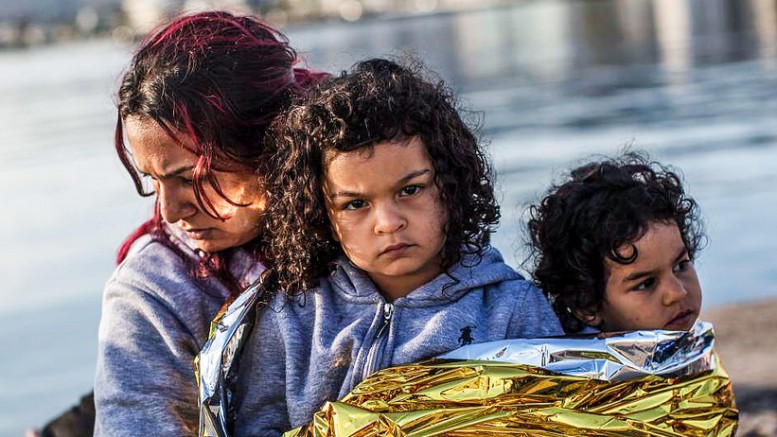Nick Malkoutzis via Macropolis | The recent attacks in Paris and Prime Minister Alexis Tsipras’s subsequent visit to Turkey in the ensuing days have done much to reveal the environment in which Greece finds itself in relation to the refugee crisis and what potential dangers lie ahead.
The Paris raids exposed the jitteriness at the heart of Europe regarding the influx of people into the European Union in a manner that is not orderly and in numbers that appear overwhelming to many of the countries affected.
It seems the Syrian passport, apparently belonging to someone who registered as a refugee on the eastern Aegean island of Leros, found at the site of the Stade de France bombing, was a fake. This will do little, though, to calm those who fear that Greece is a weak link in the EU’s effort to defend itself against uncontrolled migration and to secure its borders against jihadist terrorism.
Although it is patently obvious that neither of these goals are truly achievable, this will not stop many in the EU from pushing for stricter border policies and better management of the migration process. Greece finds itself at the forefront of these developments and, therefore, is the first in line for criticism from other EU members, such as Hungary.
Key players within the EU, such as German Chancellor Angela Merkel and European Commission President Jean-Claude Juncker, have highlighted the disproportionate burden that Greece faces as a country of first arrival. But their compassionate words have not been matched by any significant contributions towards alleviating the pressure on Greece. The programme to relocate refugees, for instance, is still moving at a snail’s pace. In fact, it has been calculated that at the current rate it would take the EU 166 years to relocate the total number of refugees it pledged to.
This means that Greece will remain under scrutiny over its management of the refugee crisis, particularly in terms of whether it is registering arrivals properly and not allowing terrorists to slip through the net.
This creates enormous pressure on a government and public administration that lack finances, resources and certain types of know-how and who are faced with sheer numbers that were inconceivable even a few months ago.
On top of this, Greece has pledged to find places to accommodate 50,000 refugees by the end of the year so they can await relocation. This goal looks like it will go the same way as the EU’s targets for relocation and find itself on the Greek calends.
Perhaps, though, a more serious problem for Greece is that while its officials run from pillar to post to deal with the continuing influx of people, the country will be squeezed ever more between Turkey, which seems reluctant to commit any serious resources to stem the flow from its shores until it has obtained a good enough offer from the EU, and the countries north of Greece, which appear to be erecting border fences one after the other.
The Former Yugoslav Republic of Macedonia, which has provided the most popular route for migrants and refugees leaving Greece, is the latest country to start building a fence, while tighter border controls between the Greek village of Idomeni and neighbouring Gevgelija already started to create a bottleneck.
Stricter monitoring of borders could have a domino effect from central Europe downwards and cause many refugees and migrants to become hemmed in, unable to find a way out of Greece.
The figurative fence-building within Europe is also a problem for Greece. EU interior ministers were due to agree on Friday to tighten passport checks at the external borders of the 26-member Schengen area. The Dutch government, meanwhile, has put forward the idea of creating a “mini-Schengen” including Austria, Germany, Belgium, Luxembourg and the Netherlands. According to reports, apart from preventing passport-free travel for EU citizens into this condensed area, it would also prevent refugees making their way to these countries to seek asylum. Instead, they would be housed in transit camps outside the “mini-Schengen” area.
At the same time, Turkish Prime Minister Ahmet Davutoğlu pledged cooperation on the flow of refugees but no concrete initiatives when Tsipras visited Ankara this week. Turkey retains the key role as far as Greece is concerned because only it has the power to prevent migrants reaching its western shores and traffickers loading them into death-traps that are then shoved across the Aegean.
Some European officials have suggested that Greece could do more to monitor its sea borders. It is no coincidence that these comments have tended to come from politicians that live in landlocked countries. There is no way that the Greek coast guard can take the risk of trying to stop these vessels, usually rubber dinghies, in the middle of the Aegean. This would be asking for a disaster, or multiple disasters to happen. The painful truth is that stopping refugee boats mid-sea and sending them back would lead to mass drownings.
Davutoğlu’s reaction suggested that the Turkish government is not willing to take decisive action until it is clear what the EU is willing to provide in return. Tsipras’s request that refugees be relocated directly from Turkey was a non-starter in this respect. Discussions about extra EU funding and other perks, such as a visa waiver for Turkish citizens, have been going on for the last few weeks but there has been no agreement yet.
In the meantime, Greece faces the rather alarming prospect that it will become increasingly isolated – by physical and mental borders – with no sign that the flow of people feeling war and destitution is going to ease up in any significant way.





